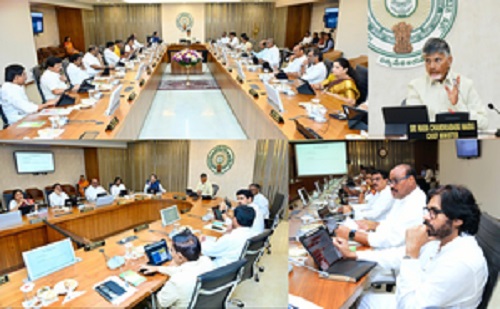
Andhra Cabinet goes paperless as work with app begins
Amaravati, Aug 28 – After a gap of five years, Andhra Pradesh Cabinet meetings have become paperless with the implementation of work through the e-Cabinet application beginning on Wednesday.
The Cabinet meeting presided over by Chief Minister N Chandrababu was conducted through the e-Cabinet application developed by the National Informatics Centre (NIC), Delhi.
I-pads, loaded and configured with the e-Cabinet application, were provided to all the ministers.
A day before the meeting all OSDs/PS to the ministers were also given training by the Information Technology, Electronic and Communications (ITE & C) Department and the NIC team on the technical aspects, usage, and benefits of the e-Cabinet application, so as to enable the ministers to use the application seamlessly.
Before the commencement of the meeting of the Council of Ministers, a demonstration on the use of I-pads and the e-Cabinet application was given to the ministers.
CM Naidu appreciated the use of the e-Cabinet app and directed all ministers to make use of latest technology in their work.
He said that the use of technology would help in taking informed decisions fast, leading to good governance.
CM Naidu also directed the ITE & C Department to improve the IT infrastructure, develop new applications to enable real-time governance, integrating all technologies like mobile, CCTV cameras, drones, fibernet etc., and using them for decision-making.
Paperless Cabinet meetings were also held between 2014 and 2019 when Naidu was the chief minister.
However, this time a comprehensive application with multiple features with end-to-end work flow has been developed with the technical support of NIC.
Officials said conducting meetings using the e-Cabinet application enhances operational efficiency and aligns with eco-friendly practices.
This facilitates online access to information, anywhere and anytime and authorises role-based information access to ensure confidentiality. Standardisation of formats and procedures, easy-to-use interface, secure and real-time access to Cabinet documents and discussions, digitisation of records and digital repository of all past meeting information, comprehensive data analytics, and reporting capabilities are the key features of the e-Cabinet application.
The system facilitates monitoring and assessing the implementation status of Cabinet decisions effectively.
The e-Cabinet application includes robust security features such as encryption, access controls, and audit trails, which will help protect sensitive information from unauthorised access and potential breaches.
The application facilitates better collaboration by allowing multiple users to access, edit, and share documents in real-time, regardless of their location.
It has additional features like the facility to conduct virtual Cabinet meetings, integrate with e-office, use of Artificial Intelligence and data analysis.